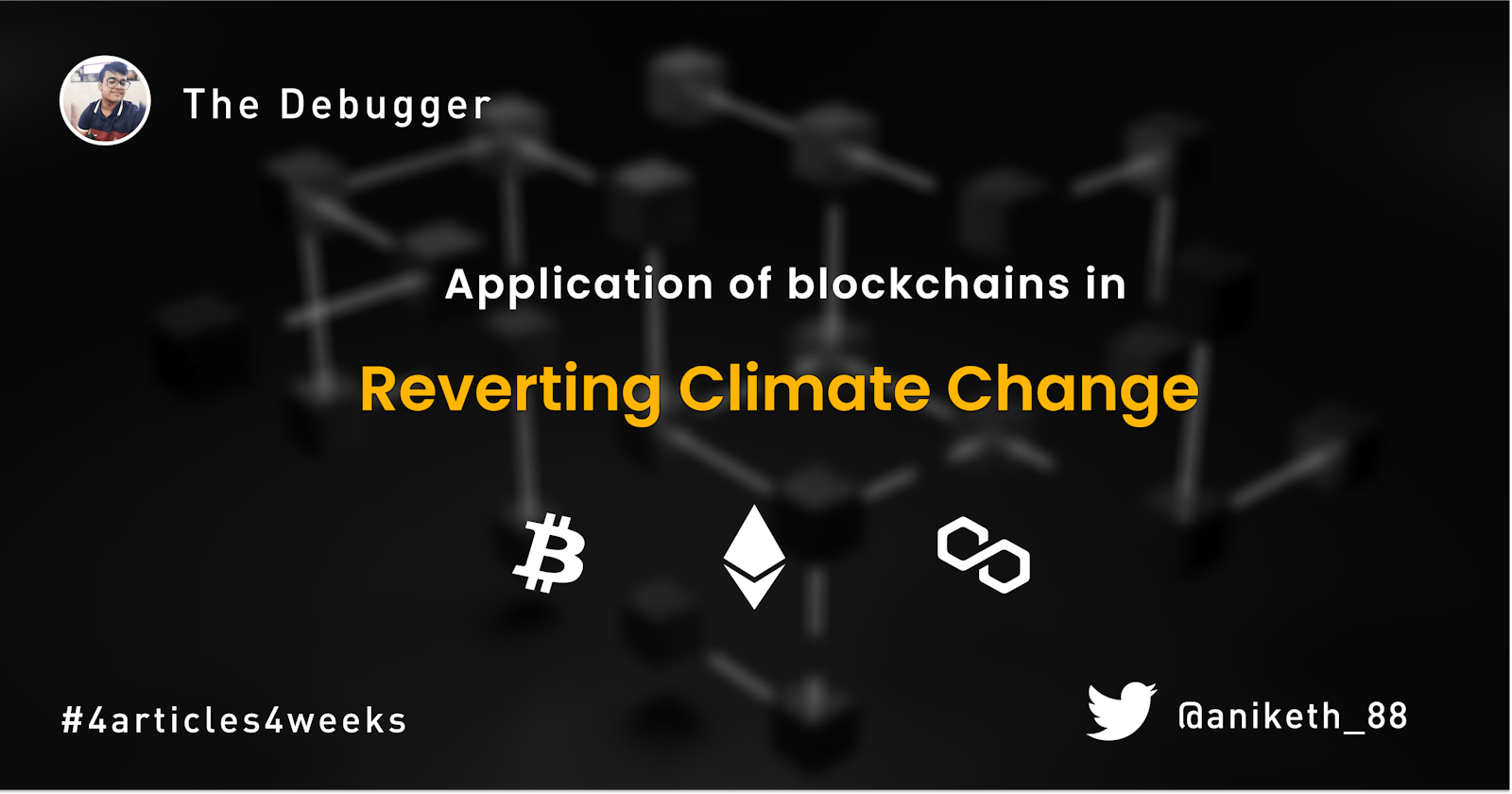How Blockchain Technology Can Stop Climate Change?
An overview of ways it can help protect the environment and stop climate change
Hey Everyone👋
In this article, we are going to talk about the ways Blockchain can solve the issue of climate change and help save the environment from its impact on the world. Our planet is slowly dying, and we have the opportunity to save it with this revolutionary technology. Climate change is a major issue and we should give importance to its causes as it's our duty to think about the planet.
Supply Chain Management
Blockchains can be used to track products from the producer to the store shelf and help prevent waste, inefficiency, fraud, and unethical practices by making the supply chain more transparent. They can also help consumers to be better informed about how each product was made and shipped so that they can make more environmentally friendly choices.
For example, if we tracked foods, this could enable buyers to purchase local produce knowing that it was grown locally. It would also help cut down on carbon emissions due to food not having to travel long distances. Blockchains could ensure that a fish being sold at a market actually came from a sustainable fisherman or verify that a bag of coffee actually came from a fair trade producer.
Provenance is a startup using blockchain technology to make supply chains more transparent.
Recycling
Current recycling programs often give little or no incentive for people to participate. The responsibility for running these recycling programs often falls on individual cities and it can be difficult to track their impact. A recycling program on the Blockchain would encourage participation by giving a financial reward in the form of a cryptographic token in exchange for depositing recyclables like plastic containers, cans, or bottles. It would also make it easy to transparently track the amounts of materials recycled, costs, and profits and evaluate the impact of each participant in the program.
Recycle To Coin is an app that provides a token reward for returning plastic containers using automated machines. Plastic Bank is another Blockchain powered project that enables the exchange of old plastic for money, items, or services in third-world countries.
Energy
Traditional power grids are centralized which can create inefficiencies in energy distribution like having an unused surplus in parts of the world affected by natural disasters or poverty. Power outages can leave people without access to electricity for long periods of time. A peer-to-peer blockchain-based energy system would reduce the need to transmit energy over long distances and save the energy that could get lost along the way by locally directing energy from where it's produced to where it's needed. It would help reduce the need for energy storage.
TransActive Grid is a joint venture between Consensys and LO3 Energy that is working on a blockchain platform that solves this problem. SunContract is a blockchain-based peer-to-peer energy trading platform for solar and other renewables.
Power plant installations are expensive and are often financed by governments or large private companies. A Blockchain-based platform would allow people to directly invest in renewable energy installations in their area and around the world. Ecochain is a blockchain app in development that aims to do exactly that. Electricchain is another blockchain platform with several apps like solarcoin which aims to incentivize solar installations around the world.
Non-Profits
When you donate to an environmental charity it can be difficult to track where the money goes or how it is spent. Bureaucracy, corruption, and inefficiency are still common in the charity space. Blockchain Technology can ensure that money intended to be a reward for conservation or payment to a specific cause does not disappear into unintended pockets through bureaucratic labyrinths. Blockchain money could even be released automatically to the right parties for meeting specific environmental targets. Blockchains enable funds to be transferred without bank accounts. This is beneficial to people in countries without good banking infrastructure. This means that it's possible to send money directly to people who need it without going through a complex web of middlemen or centralized authorities.
Bitgive Foundation and Bithope are two blockchain projects focused on ensuring that donations go where they're intended.
Carbon Tax
In the current system, it's hard to see the environmental impact of each product and its carbon footprint is not factored into the price. This means that there is little incentive for consumers to buy products with a low carbon footprint or for companies to sell such products. Tracking the carbon footprint of each product using the blockchain would protect this data from tampering and it can be used to figure out the amount of carbon tax to be charged at the point of sale. If a product with a large carbon footprint is more expensive to buy, this would encourage buyers to buy products that are more environmentally friendly and would encourage companies to restructure their supply chains to meet the demand. A Blockchain-based reputation system could also give each company and product a score based on the carbon footprint of the products they sell. This would make manufacturing more transparent and discourage wasteful and environmentally unfriendly practices.
Conclusion
There are more ways how Blockchain can contribute to climate change but as this is a new technology, more and more use-cases are still left to come. I'm still researching and will be writing more blogs for the community!
That’s it for today, I hope I could help you, and you liked it, if you want to support me then follow me and leave a comment. 😇
